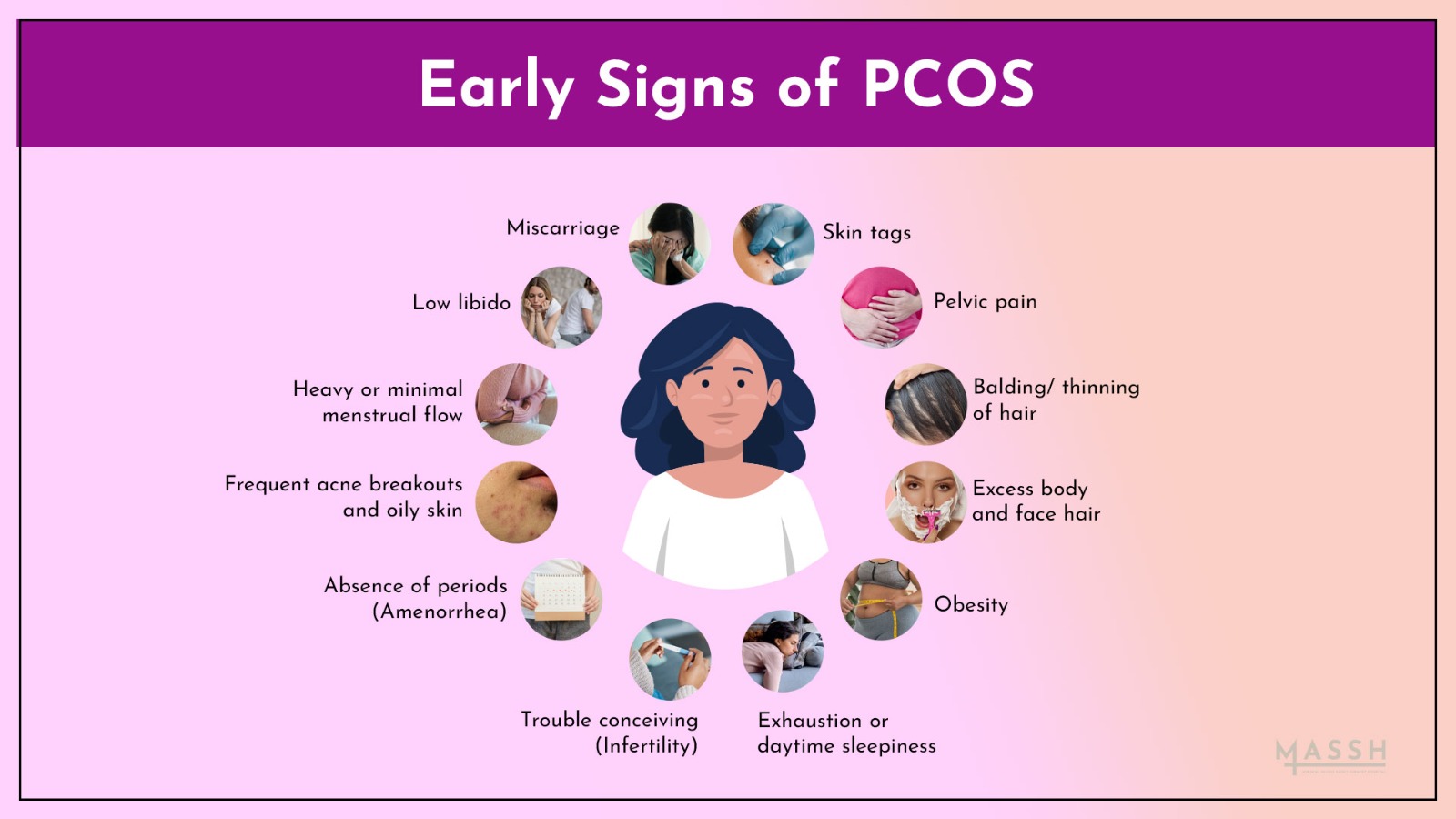The first signs of PCOS may sound not that surprising or unheard of to you. Ever gone through recurring acne, sudden weight gains and unexpected period delays? All of them could be considered as some of the very first signs of PCOS. However, don’t get scared yet, as proper diagnosis is required to determine if you have PCOS or not. Besides there are several other conditions that could cause the symptoms mentioned above.So should you be worried about PCOS at all? The answer is yes. As undiagnosed PCOS can lead to degradation of overall health and life quality and pregnancy complications. So how can you identify what are the first signs of PCOS? Let’s find out.

The exact cause of PCOS is not well understood by doctors. However, it has been observed that women who have insulin resistance are at a higher risk of getting PCOS. Genetics also play a role in PCOS risk as it has been observed that a mother with PCOS increases her daughter’s risk of the condition. The same applies if any of two or more sisters have PCOS. Obesity has also been considered a risk for PCOS as obesity has been linked with an increase in insulin resistance.
While the cause may not be fully understood, it is important to monitor the PCOS symptoms. Diagnosing PCOS can help you treat the underlying condition, which will help relieve the symptoms and improve your quality of life. The first signs of PCOS mentioned above are the symptoms that you need to monitor. However, just having any of the symptoms doesn’t mean you have PCOS.
While monitoring for symptoms, you need to monitor their frequency, longevity, and how many of the listed symptoms you seem to be experiencing. If two or more symptoms persist for months or affect your quality of life, visiting a doctor is recommended. Let’s review how doctors diagnose PCOS.
To diagnose PCOS doctors first take a good overview of your medical and family history. If you are visiting your doctor with symptoms, often having a family and medical history that leans towards PCOS, will help doctors make the diagnosis quicker. However, in some cases, medical history may not be able to offer insights into the cause behind symptoms, which makes it necessary to use diagnostic tests to determine the root cause. Here are the tests doctors commonly use for PCOS diagnosis.
Once you have your diagnosis, doctors can recommend several treatment measures to manage PCOS. In most cases, doctors recommend patients go for controlling PCOS naturally. This is mainly because PCOS is often caused by insulin resistance in the body. Lifestyle and dietary changes are in most cases able to help manage this problem. So, healthy lifestyle habits help not only manage conditions like PCOS, it also improve your overall health and immunity, creating opportunities for a better quality of life. Let’s review some of the PCOS treatment options that are generally recommended.
The treatment for PCOS is dependent on your individual diagnosis. This is mainly because doctors treat the underlying cause of PCOS in most cases, which differs from person to person. However, the golden rule of PCOS treatment is to adopt better lifestyle habits that will help you live a generally healthier life. This is recommended on three levels, lifestyle changes, dietary changes, and body weight management. Let’s review how each of these levels helps with the management of PCOS.
Lifestyle Changes
Lifestyle changes is a broad term used to define any and every habitual change you need to make to manage PCOS. This includes
Following these changes will be able to help you manage your symptoms. Even if they don’t completely treat your symptoms, it will drastically improve your quality of life. However, it should be noted that all the steps mentioned need to be followed for the treatment to be the most effective.
Dietary Changes
When it comes to dietary changes, all the suggested steps involve changing your regular diet for the better. This includes
These steps are focused on helping you manage your diet and help you create a habit of healthy eating. In some cases, diet management helps naturally resolve the symptoms and help you get back to your normal self. To help you get ideal dietary advice, your gynaecologist may recommend you to visit a dietician after diagnosis.
Weight Management
Lastly, weight management is an important part of managing PCOS as obesity is a risk factor for the condition. Being obese increases risk for PCOS and also other conditions related to your urological and reproductive health. For many people, obesity is genetic and difficult to remove with lifestyle and dietary changes. If that is the case for you, it is important to disclose that to your doctor at the time of your diagnosis. Doctors often recommend patients to get special medical treatment to manage their genetic obesity before opting for any PCOS treatment.
By identifying the underlying cause of obesity, it is possible to treat the condition even in cases of genetic obesity. So, make sure you get the right medical tests to help diagnose the condition that’s resulting in your obesity and in some cases, it can help manage your PCOS symptoms as well.
So, now that you know about the first signs of PCOS, make sure you are monitoring the signs and taking care of your health accordingly. If you are experiencing the symptoms, do not delay visiting the doctor. You can easily consult with top gynaecologists and women’s health experts today only at MASSH. Simply visit our website or our premises for a detailed diagnosis and personalised treatment plan. Check out our website to learn more and book an appointment.
Explore the link between insulin resistance and PCOS, including symptoms, causes, and treatments. Learn how managing insulin levels can improve P...
Written by MASSH
Aug 08, 2024